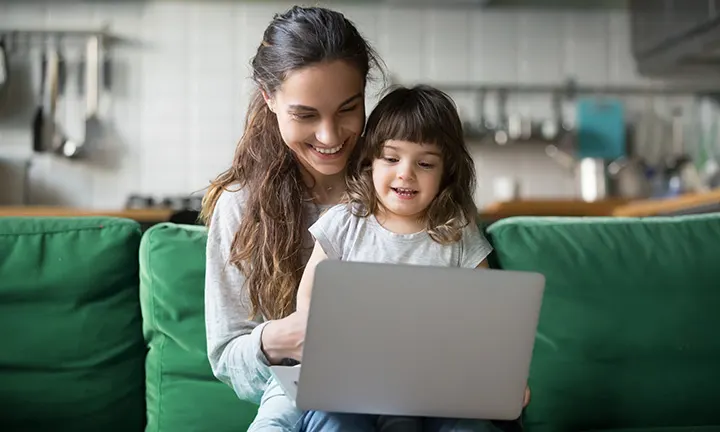How Much Screen Time Is OK for Kids?
Like many parents, you’re probably spending a lot of your day staring at a screen, whether it’s your computer, smartphone, or tablet. It’s natural for your little one to want to get in on the action. Find out at what age it’s OK to allow your child to enjoy some screen time, how much is OK, and how you can supervise her screen time to ensure she is safe.
Recommended Screen Time for Kids by Age Group
The following recommendations from the American Academy of Pediatrics can help you figure out how to introduce your child to screen time, which can include TV, tablets, computers, and smartphones. If you have any questions, don’t hesitate to consult your child’s healthcare provider for personalized guidance.
Younger Than 18 months
Introduce little or no screen time at all (with the exception of video-chatting with family members)
18 to 24 months
Limit screen time to those occasions when you or another adult can be present to watch together with your child
Choose high-quality educational programming or content
While viewing digital media, talk to your child about what’s happening in the program. This interaction can help your toddler learn about what she’s seeing on screen and how it relates to the world around her
Encourage your child to explore the physical world around her by playing and interacting with others, as this offers the best learning experience. This can include supervised indoor activities as well as outdoor play.
24 Months to 5 Years Old
Limit screen time to less than one hour a day
Choose high-quality, non-violent programming that encourages social interaction and is educational, helping to build social, language, and reading skills
Watch TV or play a video game together with your child
Around this age children may understand and even learn more words from live video-chatting with her family members, either by listening to or joining in conversations with adults
Encourage other non-screen activities for your child, ones that promote a healthy body and mind, such as reading, talking, learning, and playing.
Why Experts Recommend Limiting Your Child’s Screen Time
According to children's health experts, limiting time spent on screen media is the best choice for babies and young children because their bodies and brains are in a critical stage of development. Screen media can include devices such as TVs, computers, tablets, and smartphones.
To learn and grow properly, children under the age of 2 need hands-on exploration of the physical world and social interaction with their parents and caregivers, which is why limiting screen time is so important.
After your child reaches 2 years old, he may benefit from small amounts of screen time, especially if it’s high-quality, education programming that is viewed together with an adult who can explain what is happening on screen and how it relates to the real world.
If you’re ever unsure about the quality of a specific program, channel, game, or app, consult your child’s healthcare provider, who may be able to guide you.
How Screens Can Affect Your Child’s Development
Here are some negative effects too much screen time can have on children's development:
Developmental delays. Children who are exposed to too much TV in infancy and their preschool years may have delays in their language and social skills. This may be the result of spending less time interacting with their parents or other family members.
Behavioral issues. Violent digital content or games can have a negative impact on your child, creating fear or confusion. He may even try to copy what he sees on the screen.
Sleep disruption. Screen time, especially when it occurs within one hour of bedtime, can lead to overstimulation and prevent babies and young children from falling asleep and getting enough quality sleep. Moreover, the presence of a TV or any device with a screen in the bedroom can lead to your child sleeping less or falling asleep later. This overstimulation can impede the quality sleep your child needs to grow.
Obesity. Children who have too much screen time during the preschool years are at risk of becoming overweight or obese. Watching too much TV, for example, can reduce the amount of time spent being physically active, whether indoors or outside. Exposure to food advertising and snacking while watching TV may also be contributing factors.
8 Tips for Limiting Screen Time
Here are ways you can limit your older child’s screen time—whether it’s on a TV, computer, tablet, or smartphone—and encourage your family's healthy use of digital media and screen time:
Have quality screen time together. Play a game with your child or watch an educational TV program or movie together. Choose a program that teaches good values like empathy or tolerance, or models good interpersonal skills. Use this opportunity to interact with her and discuss what’s happening in the game or video. Avoid content and programs that are not appropriate for your child’s age or stage of development.
Turn off the TV when it’s not in use. Especially when no one’s watching the TV, you don’t want it blaring in the background. It can be a distraction from playtime and your parent-child bonding moments, and can also interfere with your child’s language and social-emotional development.
Establish screen-free times. Put screens away during family mealtimes and your child’s playtimes. To model good behavior, this rule should also apply to adults—so, put away your smartphone during mealtimes, playtime, and story time.
Ban screen time before bed. You’ll want to make sure your child isn’t exposed to a screen at least one hour before her bedtime. And be sure to keep screens out of her bedroom.
Avoid using media as a soothing mechanism. Now and then, it's OK to use media to keep your child calm, such as during a doctor’s visit or on an airplane flight. But it’s not a good idea to do this with regularity as it can lead to issues with your child managing her emotions or relying on a screen to distract her from emotions like boredom or being upset.
Encourage other activities. Unstructured play and human interaction are an important part of your child’s development. These are opportunities for your child to think creatively, problem solve, and develop reasoning and motor skills. This active time is better for her overall development than passive media consumption, so encourage lots of this kind of activity and give it priority over screen time.
Create a family media plan. It’s a good idea to institute a media usage plan for your entire family, especially if you have more than one child. Here are two tools that can help you create a family media plan that’s appropriate for each person in your household according to their age.
Get on board with other parents. You could start a “screen-free week” or a “media diet” in your neighborhood, at your child’s daycare or school, or wherever you feel most comfortable. Band together with other like-minded parents and try to make a difference in your kids’ lives. A built-in support group can make it easier for you to follow through on whatever guidelines or limits you come up with.
The Bottom Line
As your child becomes older and more independent, helping him balance his online and off-line time can become more challenging, especially because screens play such a prominent role in our lives. It's important to remember that limiting your child’s screen time, and making thoughtful choices about digital media consumption, can have positive impacts on his mental, emotional, and physical development.
For now, when your little one is still a baby, toddler, or preschooler, keeping this guidance in mind and using the tips in this article can help your little one get a taste of age-appropriate, high quality content while avoiding the negative effects of having too much screen time.
How We Wrote This Article The information in this article is based on the expert advice found in trusted medical and government sources, such as the American Academy of Pediatrics and the American College of Obstetricians and Gynecologists. You can find a full list of sources used for this article below. The content on this page should not replace professional medical advice. Always consult medical professionals for full diagnosis and treatment.
Read more about Toddler
Join a World of Support
through Pregnancy and Parenthood.
TRACK WITH TOOLS
LEARN WITH EXPERTS
GET REWARDED












